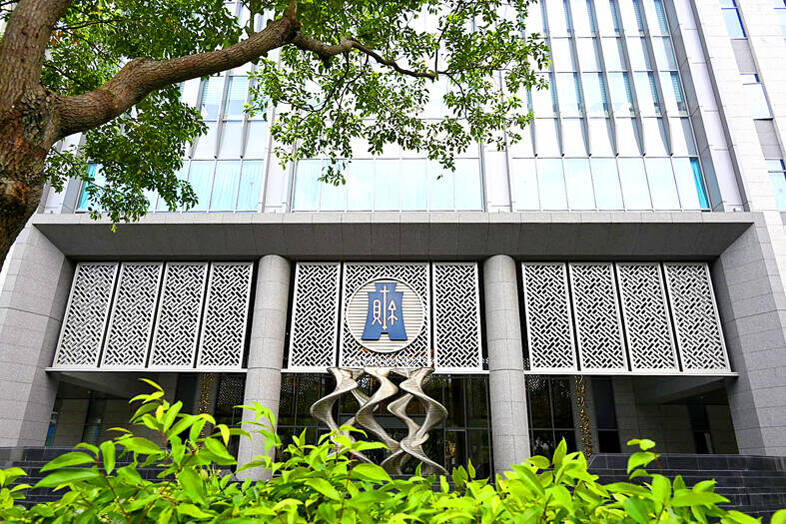Leaked documents related to customs clearance procedures for vice president-elect Hsiao Bi-khim (蕭美琴) that have been circulating on the Internet appear to be an attempt to manipulate public opinion against the government, a source said on Sunday.
A post on online platform Baoliao Commune (爆料公社) on Sunday showed documents it said were evidence that Hsiao had smuggled alcohol through customs with the assistance of the Ministry of Foreign Affairs, and said that the documents were part of a 4GB data dump of confidential material acquired by hackers.
In a rebuttal, the source said that they were not confidential documents, but rather unclassified internal communications between the Ministry of Foreign Affairs, the National Treasury Administration and Keelung Customs Service.

Photo: Chang Chia-ming, Taipei Times
The documents, which were dated March 15, were part of regular customs procedures, the source said, adding that Hsiao had applied for exemption from inspection of 23 bottles of wine for personal use, which was in accordance with regulations.
The wine, along with other personal items, were shipped by sea by Green Van from the US where Hsiao was previously stationed as Taiwan’s representative, the documents showed.
One of the documents shows a reply from the Ministry of Finance to the Ministry of Foreign Affairs, saying: “The request of Hsiao Bi-khim, former ambassador to the United States, for exemptions from a tobacco and alcohol import license, and exemption from inspection of imported alcohol items has been approved,” as long as the items are not used for any commercial purpose, which would constitute illegal alcohol sales.
When diplomats stationed abroad return to Taiwan they can apply for exemptions from customs duties on items brought back for personal use, the source said.
“The information on the documents was clear and the procedures were legal, but there should be an investigation into how the documents were leaked to begin with,” the source said, questioning the intent and motive of whoever leaked the documents.
“What is even more bizarre is that as soon as the documents appeared online, an anonymous user immediately posted to the Baoliao Commune making accusations of corruption,” the source said.
“This is obviously a state-level organized attack to influence public opinion,” the source said.
The post appeared similar to one made last year alleging that the DPP was putting thousands of people under surveillance, the source said, adding that both posts were political in nature and aimed at manipulating public opinion.

US climber Alex Honnold is to attempt to scale Taipei 101 without a rope and harness in a live Netflix special on Jan. 24, the streaming platform announced on Wednesday. Accounting for the time difference, the two-hour broadcast of Honnold’s climb, called Skyscraper Live, is to air on Jan. 23 in the US, Netflix said in a statement. Honnold, 40, was the first person ever to free solo climb the 900m El Capitan rock formation in Yosemite National Park — a feat that was recorded and later made into the 2018 documentary film Free Solo. Netflix previewed Skyscraper Live in October, after videos

Starting on Jan. 1, YouBike riders must have insurance to use the service, and a six-month trial of NT$5 coupons under certain conditions would be implemented to balance bike shortages, a joint statement from transportation departments across Taipei, New Taipei City and Taoyuan announced yesterday. The rental bike system operator said that coupons would be offered to riders to rent bikes from full stations, for riders who take out an electric-assisted bike from a full station, and for riders who return a bike to an empty station. All riders with YouBike accounts are automatically eligible for the program, and each membership account

NUMBERS IMBALANCE: More than 4 million Taiwanese have visited China this year, while only about half a million Chinese have visited here Beijing has yet to respond to Taiwan’s requests for negotiation over matters related to the recovery of cross-strait tourism, the Tourism Administration said yesterday. Taiwan’s tourism authority issued the statement after Chinese-language daily the China Times reported yesterday that the government’s policy of banning group tours to China does not stop Taiwanese from visiting the country. As of October, more than 4.2 million had traveled to China this year, exceeding last year. Beijing estimated the number of Taiwanese tourists in China could reach 4.5 million this year. By contrast, only 500,000 Chinese tourists are expected in Taiwan, the report said. The report

Temperatures are forecast to drop steadily as a continental cold air mass moves across Taiwan, with some areas also likely to see heavy rainfall, the Central Weather Administration (CWA) said. From today through early tomorrow, a cold air mass would keep temperatures low across central and northern Taiwan, and the eastern half of Taiwan proper, with isolated brief showers forecast along Keelung’s north coast, Taipei and New Taipei City’s mountainous areas and eastern Taiwan, it said. Lows of 11°C to 15°C are forecast in central and northern Taiwan, Yilan County, and the outlying Kinmen and Lienchiang (Matsu) counties, and 14°C to 17°C